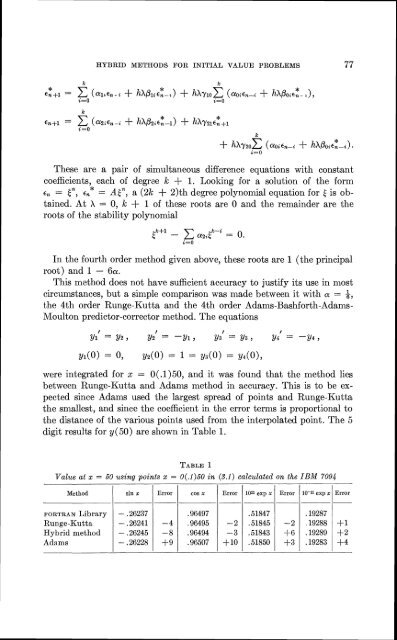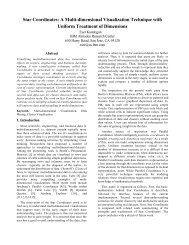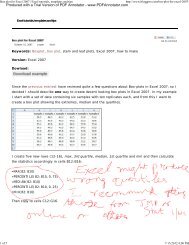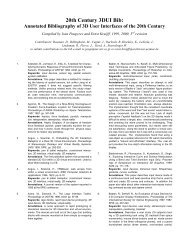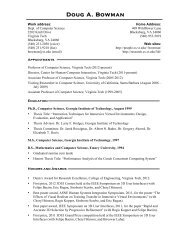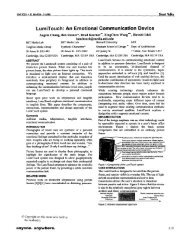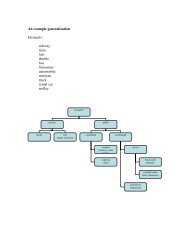Hybrid Methods for Initial Value Problems in Ordinary Differential ...
Hybrid Methods for Initial Value Problems in Ordinary Differential ...
Hybrid Methods for Initial Value Problems in Ordinary Differential ...
You also want an ePaper? Increase the reach of your titles
YUMPU automatically turns print PDFs into web optimized ePapers that Google loves.
HYBRID METHODS FOR INITIAL VALUE PROBLEMS<br />
These are a pair of simultaneous difference equations with constant<br />
coefficients, each of degree k + 1. Look<strong>in</strong>g <strong>for</strong> a solution of the <strong>for</strong>m<br />
en = tn, en* = Atn, a (2k + 2)th degree polynomial equation <strong>for</strong> is ob-<br />
ta<strong>in</strong>ed. At X = 0, k + 1 of these roots are 0 and the rema<strong>in</strong>der are the<br />
roots of the stability polynomial<br />
In the fourth order method given above, these roots are 1 (the pr<strong>in</strong>cipal<br />
root) and 1 - 6a.<br />
This method does not have sufficient accuracy to justify its use <strong>in</strong> most!<br />
circumstances, but a simple comparison was made between it with a = 3,<br />
t'he 4th order Runge-Kutta and the 4th order Adams-Bash<strong>for</strong>th-Adanis-<br />
Nloulton predictor-corrector method. The equations<br />
were <strong>in</strong>tegrated <strong>for</strong> n: = 0(.1)50, and it was found that the method lies<br />
between Runge-Kutta and Adams method <strong>in</strong> accuracy. This is to be ex-<br />
pected s<strong>in</strong>ce Adams used the largest spread of po<strong>in</strong>ts and Runge-Kutta<br />
the smallest, and s<strong>in</strong>ce the coefficient <strong>in</strong> the error terms is proportional to<br />
the distance of the various po<strong>in</strong>ts used from the <strong>in</strong>terpolated po<strong>in</strong>t. The 5<br />
digit results <strong>for</strong> y(50) are shown <strong>in</strong> Table 1.<br />
TABLE1<br />
<strong>Value</strong> at x = 50 us<strong>in</strong>g po<strong>in</strong>ts x = 0(.1)50<strong>in</strong> (3.1) calculated on the IBM 7094<br />
Method I r<strong>in</strong> x 1 Error 1 cos x 1 Error 1 1022 exp x 1 Error 1 10-21 cxp / Error<br />
FORTRAN Library - ,26237 .96497<br />
Runge-Kutta - ,26241 -4 ,96495<br />
<strong>Hybrid</strong> method - .26245 -8 .96494<br />
Adams - .26228 +9 .96507<br />
77


